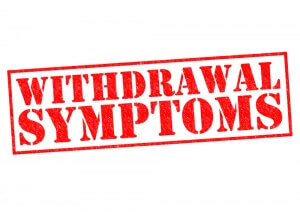 Alcohol withdrawal is what happens when someone who has been drinking too much, for too long, stops drinking. The symptoms can include difficulty sleeping, nightmares, shakiness, irritability, anxiety or nervousness, fatigue or extreme tiredness, headache, jumpiness or shakiness, restlessness, mood swings, depression, craving alcohol, not thinking clearly, nausea, sweating or clammy skin. Other symptoms may include: enlarged (dilated) pupils, loss of appetite, nausea and vomiting, pallor, rapid heart rate, and tremors (shakiness) of the hands or other body parts. A severe form of alcohol withdrawal called delirium tremens (the DTs) can cause agitation, fever, seeing or feeling things that aren’t there (hallucinations), seizures and severe confusion. These are all signs that the body and the brain have become dependent on alcohol. This is a sign of addiction. When alcohol is removed, the system goes into withdrawal and is reacting to not having alcohol.
Alcohol withdrawal is what happens when someone who has been drinking too much, for too long, stops drinking. The symptoms can include difficulty sleeping, nightmares, shakiness, irritability, anxiety or nervousness, fatigue or extreme tiredness, headache, jumpiness or shakiness, restlessness, mood swings, depression, craving alcohol, not thinking clearly, nausea, sweating or clammy skin. Other symptoms may include: enlarged (dilated) pupils, loss of appetite, nausea and vomiting, pallor, rapid heart rate, and tremors (shakiness) of the hands or other body parts. A severe form of alcohol withdrawal called delirium tremens (the DTs) can cause agitation, fever, seeing or feeling things that aren’t there (hallucinations), seizures and severe confusion. These are all signs that the body and the brain have become dependent on alcohol. This is a sign of addiction. When alcohol is removed, the system goes into withdrawal and is reacting to not having alcohol.
Alcohol withdrawal can be life threatening and should always be medically assessed. Treatment and medical detoxification can lessen the effects of alcohol withdrawal and help to reduce or prevent dangerous complications. In detox medications to ease the effects of the withdrawal can be given for comfort and safety. Following detox, in-patient or out-patient treatment can assist in achieving long-term, permanent sobriety. For someone who has gone through alcohol withdrawal, abstinence from alcohol is advisable, as dependency and even worse withdrawal is probable if drinking is resumed.
Acute alcohol withdrawal symptoms usually start within a few hours after stopping drinking and can last up to a week or more, usually peaking at about five days. The most dangerous period is 12 to 72 hours, but medical detox (detoxification) and careful supervision can help manage symptoms and is necessary, usually for at least five to seven days. After the acute withdrawal phase, protracted withdrawal, often called post acute withdrawal or PAWS, can last for weeks, months or even years and can be experienced as periodic episodes of withdrawal symptoms.
So, how much does someone have to drink to experience withdrawal? Each case is individual and many factors can have an effect on alcohol withdrawal. Generally speaking daily excessive drinking can result in withdrawal symptoms and the longer and the more someone drinks, the worse the withdrawal. Binge drinkers or periodic drinkers can also experience withdrawal symptoms. Even “tying one on” or a night of heavy drinking can produce a “hangover,” which can mimic some withdrawal symptoms and is, in a way, a mild form of alcohol withdrawal.
If you are experiencing any of these withdrawal symptoms you may have Alcohol Use Disorder. According to a National Institute on Alcohol Abuse and Alcoholism article, “Approximately 7.2 percent or 17 million adults in the United States ages 18 and older had an AUD (Alcohol Use Disorder) in 2012. This includes 11.2 million men and 5.7 million women. Adolescents can be diagnosed with an AUD as well, and in 2012, an estimated 855,000 adolescents ages 12–17 had an AUD.” As stated in the same article, “Unfortunately, only a fraction of people who could benefit from treatment receive help. In 2012, for example, 1.4 million adults received treatment for an AUD at a specialized facility (8.4 percent of adults in need). This included 416,000 women (7.3 percent of women in need) and 1.0 million men (8.9 percent of men in need).” (http://www.niaaa.nih.gov/alcohol-health/overview-alcohol-consumption/alcohol-use-disorders).
Medical assessment and treatment is critical for anyone experiencing alcohol withdrawal symptoms, due to the potentially life threatening possible complications. If you, or someone you know, have been drinking a lot and for a long period of time, especially if it is daily, or even “binge” drinking, it is important to get medical help. Don’t hesitate to call a professional and get the help that can be life saving. Alcohol withdrawal can become deadly very quickly.
Contact or call 888-345-7505 to speak with a trained specialist at Beachway Therapy Center to learn more about their alcohol treatment services.
